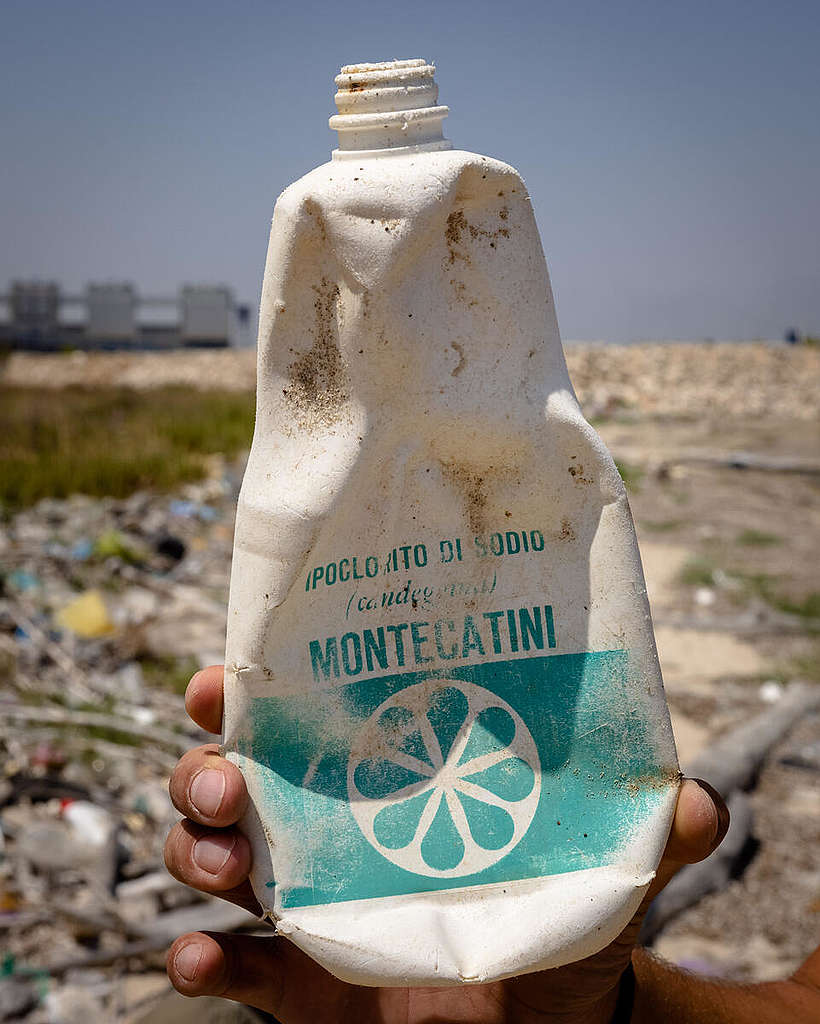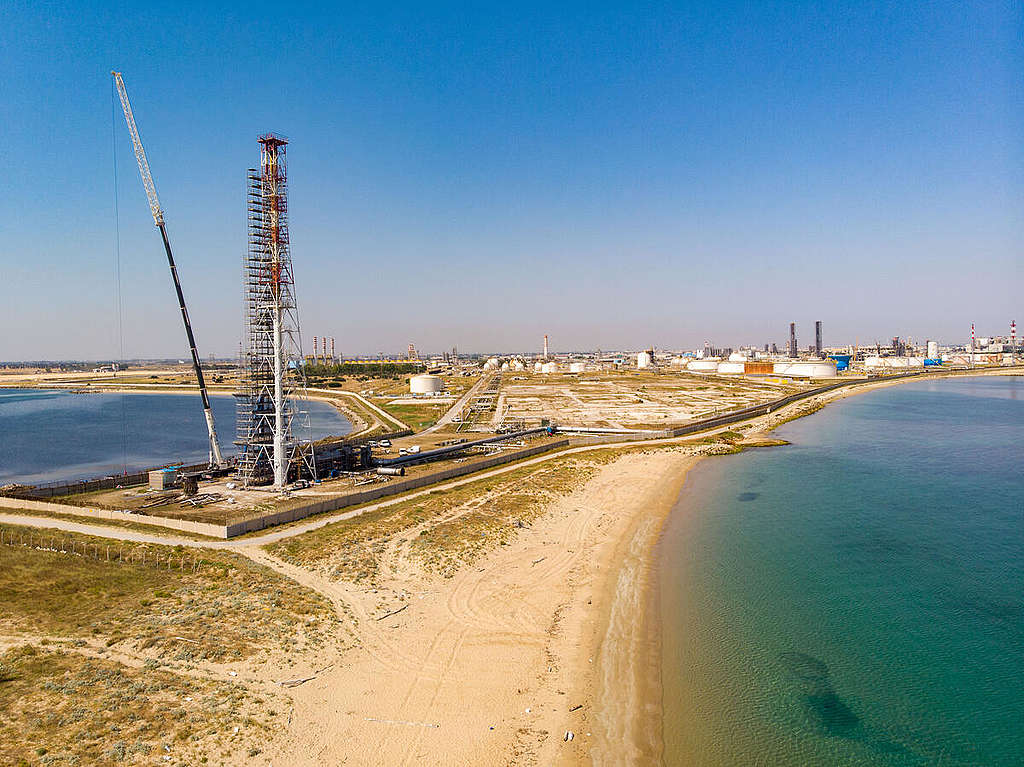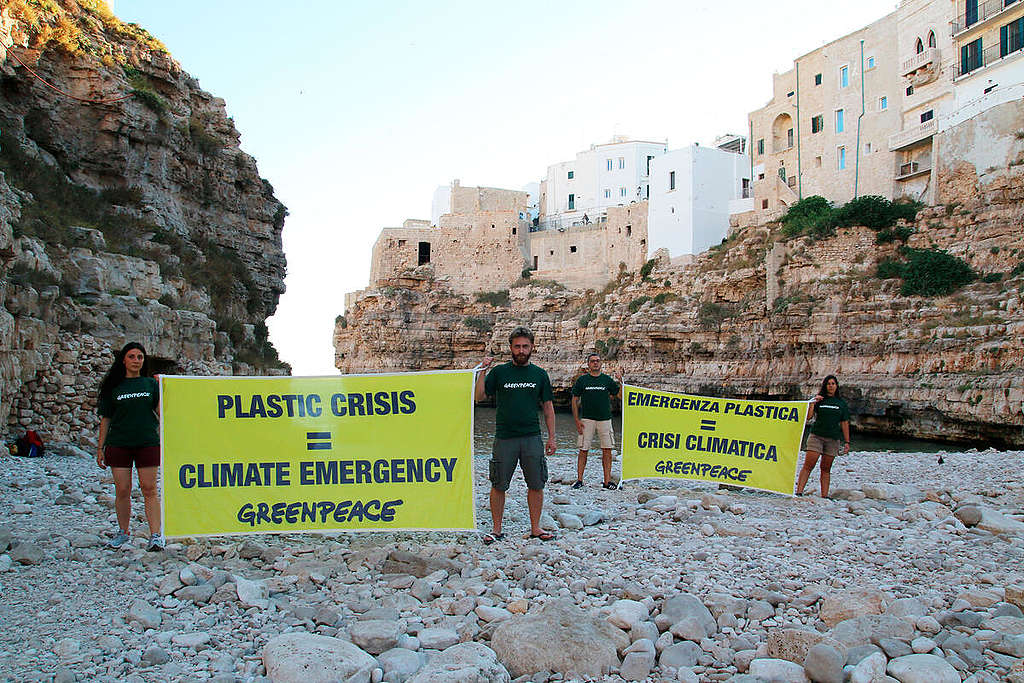I recently had the chance to visit the Adriatic coast as part of a ship tour Greenpace Italy organises every year with our partners at the Exodus Foundation, researchers at CNR-IAS and the University of Marche in Ancona. While walking on one of the beaches in Brindisi, in Southern Italy, I witnessed a huge amount of plastic waste spread all over the beach: drinking bottles, fishing gear and lots of single-use packaging items. Sadly, this has become an all-too common sight on many beaches all over the world.
Throwing away? There is no 'away'
One of these items in particular caught my attention: a bleach bottle manufactured in the 1960s by the Montecatini company. This chemical company specialised in the production of plastic polymers such as polypropylene, invented by the Italian scientist Giulio Natta, the winner of the Nobel Prize for chemistry in 1963.
The Montecatini company doesn't exist anymore, but the plastic they produced remains as discarded trash on a beach, almost fifty years after its contents were used and the container 'thrown away'. This was a stark reminder that once plastic is out in nature, it can remain intact for decades, if not centuries.

A toxic legacy
Over the last decades Montecatini assets have been sold to other chemical companies, including one of the biggest plants in Brindisi, on the south-eastern coast of Italy.
Versalis, the chemical branch of the Italian oil and gas giant ENI, is now among the owners of this factory. This company manufactures plastic polymers, especially polyethylene – the most common material used for single-use plastic packaging all over the world.
The factory in Brindisi is where the first step of the plastic life cycle starts. Here, oil and gas are turned into small pieces of plastic known as nurdles or pellets – the raw materials for a million bleach bottles and other products. These are the same type of plastic nurdles which recently covered the beaches of Sri Lanka after the accident of MV Xpress Pearl.
People living in the city of Brindisi are familiar with nurdles. Lena and Fabrizia, two local women, told me that "in the sixties, when the petrochemical plant was built, they switched from playing on beaches of sand, to beaches full of plastic pellets".
In the 1960's, a brand-new chemical plant was seen as a big opportunity to bring prosperity and economic progress to a largely rural area of Southern Italy. Many people who were originally working in farms left their jobs to start a new life in plastic manufacturing. But that economic dream soon vanished.

Daniele, a 40 year old local, told me that "the plant has brought only the illusion of well-being". He reports, together with many local residents, of "coping with pollution and frequent gas flaring from the plant, associated with the emission of hazardous gases. Benzene, for example, a well-documented carcinogenic in humans, has often reached concerning levels in the air of the city".
In Spring 2020, the mayor of Brindisi temporarily stopped the petrochemical plant activities to reportedly protect communities from this pollutant. After a few weeks, the plant has returned to operation and I've personally seen frequent flames from the factory stacks during my short visit to the city.
Fossil fuels and the plastic crisis: two faces of the same dirty coin
Behind the stories of pollution impacting communities all over the world there is the plastic packaging we use everyday to wrap our food, beverages, and personal hygiene products.
These are the single-use products that big brands like Coca Cola, Nestlé, PepsiCo, P&G, and Unilever continue to use in huge quantities – flooding the global market, and the whole planet, with plastic.

The demand for plastic these big brands are creating offers a big opportunity for oil & gas companies to continue their dirty business, simply by switching from fuel production to plastic production. For this reason, the plastic crisis and climate emergency are two faces of the same dirty coin.
At Greenpeace, we support the frontline communities living with this toxic nightmare, and will fight with them to end the pollution and damage caused by the fossil fuels and plastics industries. We must accelerate the just transition to a green economy, where the fossil fuel companies and the plastics production that is enabling them become, just like the Montecatini bleach bottle, a relic of the past.
Giuseppe Ungherese, Toxics Campaigner in Greenpeace Italy leads the work on plastic and is based in Rome






